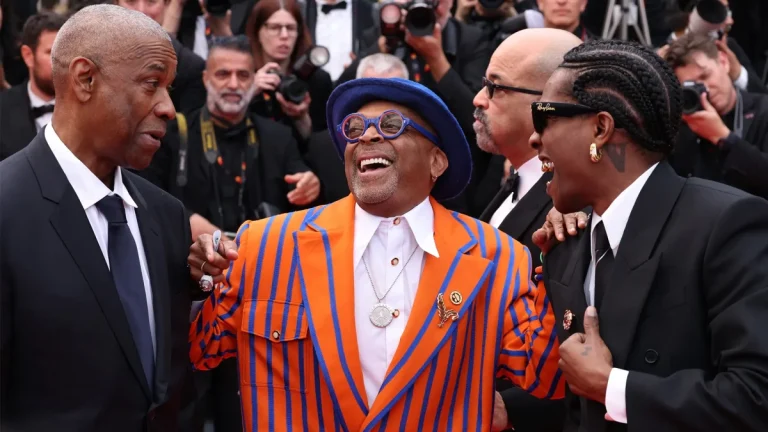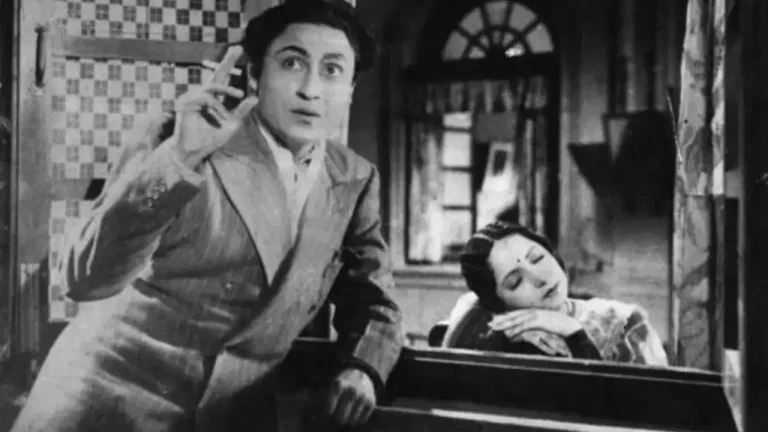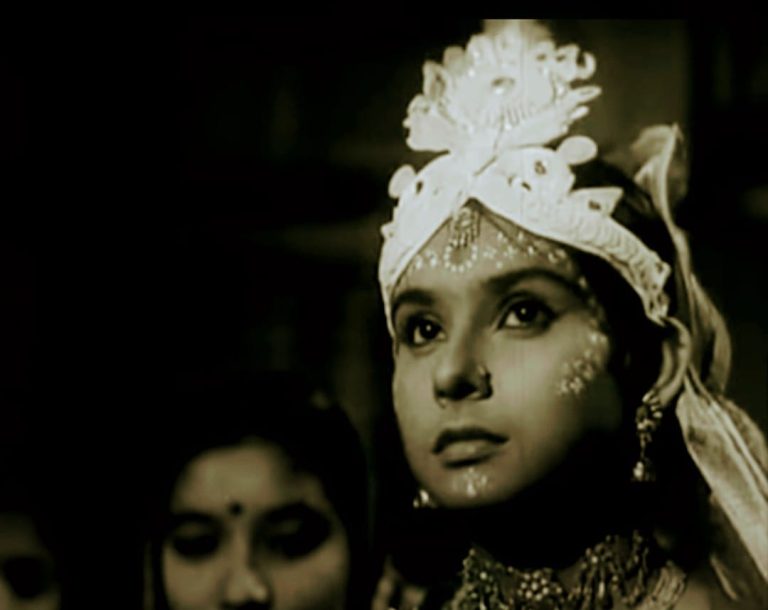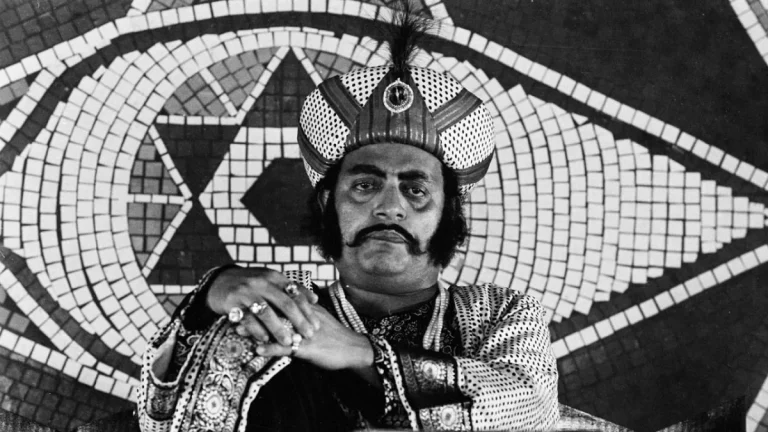Only recently, romantic narratives of same-sex love—without the customary dark, tragic end—have begun to emerge in our cinema. But even so, most are centered around young, upper- or middle-class characters. Arun Fulara’s short films, Sunday (2020) and My Mother’s Girlfriend (2021) are companion stories centered on middle-aged, working-class, same-sex desire. In Sunday, a man yearns for the touch of a young barber he fancies at a salon. In contrast, in Mazhya Aaichi Girlfriend/My Mother’s Girlfriend, a man struggles to come to terms with the fact that his widowed mother is in a relationship with another woman.
Sunday begins with a serious-looking man standing before the mirror, rubbing cream over his weather-beaten face. Kamble (Shrikant Yadav) sets out, takes a launch ride, then walks into ‘Arman Salon’ with the air of a regular customer and sits down, awaiting his turn. His face is tense, and his hands fidgety as his eyes flit around. Upon overhearing a fellow customer sweet-talking a lover over the phone, he scowls. He looks like a conservative middle-aged uncle, irritated, impatient, and disapproving of public expressions of romance. But why has he come here all this way on a Sunday morning?
And then (as if in answer to this question)—his eyes rest upon a young barber (Prakash Joshi) at work, and his body immediately relaxes; he leans back, and his face softens. The barber spots him in the mirror and turns to smile at him in greeting. And instantly, Kamble’s face lights up with the brightest smile. It is a remarkable transformation—from a scowl to a blush—that makes him look like a teenager who his crush has noticed. In that instant, we realize how easily we judge people by their appearance, how misleading our deductions of the stern-faced stranger on the street can be.
As Kamble filters out the busy sounds around him and the sound of clipping scissors fill up the scene, we feel the intimacy, even eroticism, of something as banal as the snipping sound of the scissors in the hands of a person, working its way through the hair of another. To add to this, the barber is named ‘Jaan’ (Soul/Love). As Kamble’s reverie keeps getting interrupted by the others around him, his scowl returns, and as Jaan attends to another customer, he hides behind a newspaper and watches the two like a jealous, sullen young lover.
When his turn arrives, he rushes to take his chair with the disarming excitement of a child. He closes his eyes; Jaan bends over him to spray his face with water, gently massage lather, and shave it while holding him by the shoulder. We are struck again by their proximity and the intimacy of an act that otherwise seems nondescript. We look at this scene through Kamble’s eyes, imagining the two men as lovers, with one caressing the other who lies back, vulnerable and receptive—a little salon of desires on a busy Sunday morning, in full public view.
The shave ends all too quickly, and when Jaan recommends he shave off his mustache, Kamble blushes but demurs as if protesting a lover’s request. Kamble returns home with a gentle smile playing on his face; this sweet memory will have to last him a week. It is a humble, lower-middle-class home, with a woman—probably his wife—busy in the kitchen in the background. Kamble wordlessly goes straight to the mirror. Covering his lower face with his hand, he imagines himself cleanshaven and smiles shyly but with repressed joy at his reflection. It is a scene reminiscent of another gay man standing before the mirror, thrilled by the memory of his lover’s touch—a remarkably expressive Nivin Pauly in Moothon. Sunday ends on this gently wistful note, a tender ode to repressed longings and stolen pleasures.
Intriguingly, Shrikant Yadav’s sensitive portrayal of a quiet and desirous Kamble calls to mind his more recent role in another short film, The Mirror (in the anthology Lust Stories 2). In that film, he plays a secondary character, caught in the web of desires and egos between two women who test the limits of their erotic fantasies of exhibitionism and voyeurism. He seems largely functional in the plot till the scene where he suddenly confronts his wife about the value of his desires and consents when he suddenly emerges as a dignified individual before our eyes. There too, the mirror acts as a conduit of forbidden desires.
In My Mother’s Girlfriend, we find two middle-aged working-class women—one Hindu and the other Muslim—engrossed in conversation at the vegetable market. Renuka (Sushama Deshpande), a vegetable seller, is coaxing Sadiya (Anju Alva Naik) to take a day off from work the next day to celebrate her birthday. The two women could pass off as close friends, but for the last lingering shot of their hands shyly brushing against each other and lingering in the busy marketplace. The following day, they stroll along the beach, laughing, talking, and flirting with each other. Renuka insists on having junk street food, for which Sadiya roundly tells her off, but this is her cheat day. A man (Suhas Sirsat) driving past in his taxi spots the two and is visibly worried at what he sees.
A flashback later, we realize this is Renuka’s son, Mangesh, to whom she lied the previous day about being unable to spend her birthday with him because she planned to be at the temple all day. She had also breezily lied about her relationship with Sadiya. She lies again when Mangesh confronts her over the phone in the present time. After this interruption, we return to the two women steeped in joyful laughter and contentment, holding hands and sitting by the sea, watching the waves and the sun coming down. They are in their own private world, in a very public place, at ease with what must look to others as their friendly intimacy.
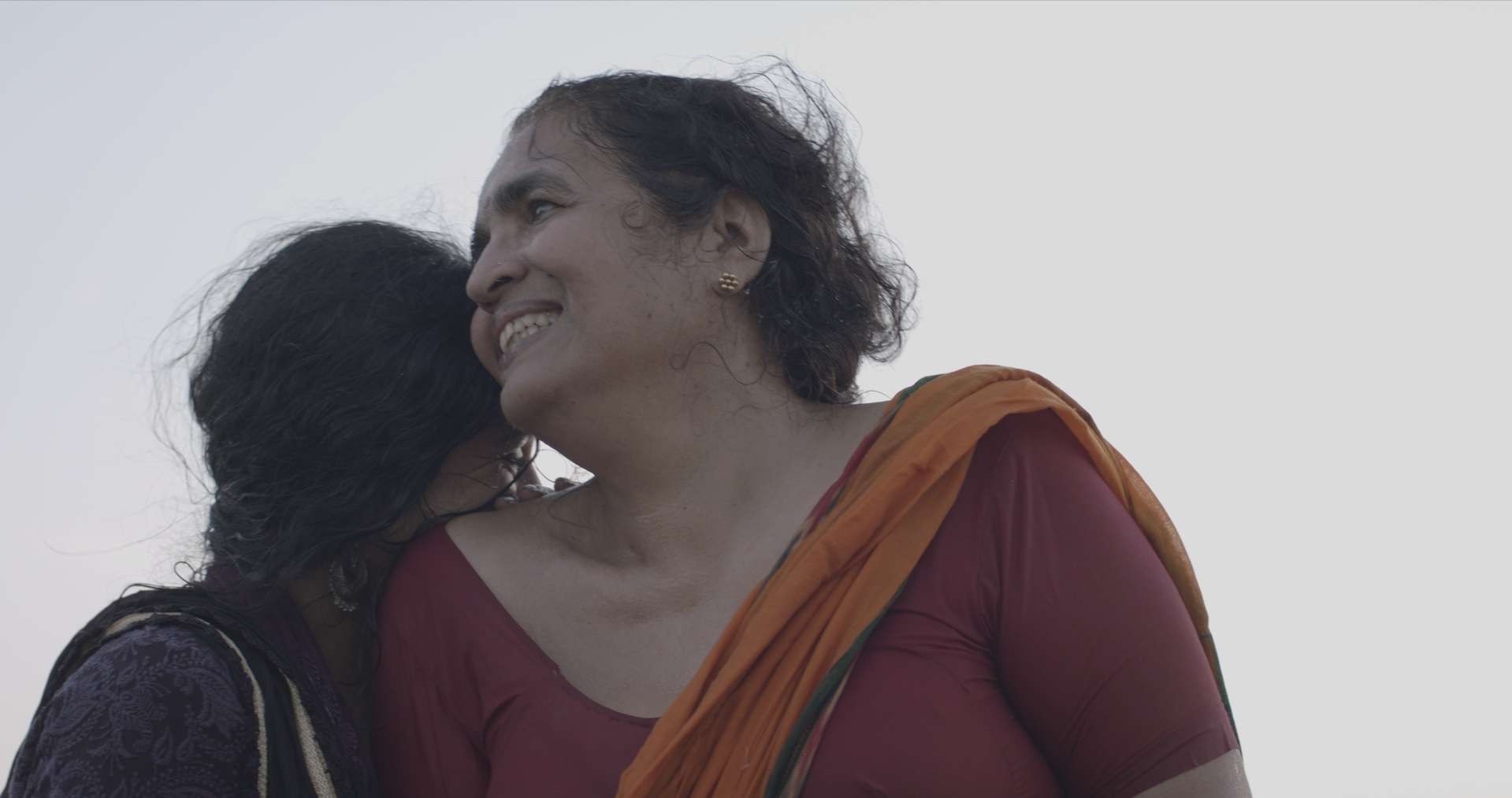
Later, they proceed to Renuka’s home and spend the night together, becoming young and carefree, communicating in the universal language of caresses, deep gazes, and kisses—just two people in love. They are not aware a disbelieving Mangesh is watching them. Here we have an exciting reversal to the usual premise about parental disapproval of homosexual love; the child is confronted with his parent’s sexuality. Renuka isn’t the typical asexual mother figure and is in love with a Muslim woman.
Mangesh spends the night waiting by her lane and, the following day, confronts his mother, his words dripping with righteous censure. Renuka is offscreen, in the kitchen, grinding spices; the sounds of her rhythmic pestle calmly punctuating his speech. Mangesh tries to instill a sense of duty and shame in her, demanding an explanation as more of a man than a son. Finally, Renuka bursts out from the kitchen, refusing to be shamed and declaring that it’s none of his business, and she is done listening to everyone’s opinions on her life; it is a mother who stands before her son, claiming her individual dignity. Exhausted from the agitation, she collapses, breathless, as if resulting from long years of suffocation as a heterosexual woman.
A scared Mangesh looks around frantically for her medicines but cannot find them. In his desperation, he calls Sadiya, who arrives and tends to Renuka. Son and beloved join forces to scold Renuka for defying her diet, united by their concern for her. With this incident, the expression of love enters a different kind of intimacy beyond sexual intimacy—one built on caregiving and emotional sustenance. For Mangesh, his mother’s girlfriend is no longer an abstract vamp who has ‘seduced’ his mother but a friend and well-wisher who cares for her much as he does and is as exasperated by her as him. A tired but content Renuka sends them both away, asking Mangesh to drop Sadiya off to work, and the film closes with the two of them setting off together in the taxi with awkward politeness, but hopefully on a new journey of mutual acceptance.
The two films complement each other in fascinating ways. While one story thrives on silences and shy smiles, the other features unashamed declarations of love; in one, we find reciprocated love, and in the other, unrequited desire. But both are united by the centrality of ‘touch’—those that are forbidden, those that blossom in seclusion, and those that have ironic social sanction and which become stolen pleasures in a homophobic world. The characters in both films move between the public and private worlds in search of safe havens for feeling and expressing love, stealing a cheat day to be their true selves.
Both films de-glamourize same-sex love as a regular, everyday feeling, making us wonder how many Kambles and Renukas must be surrounding us, spending all their lives hungering for a touch of love. They stir in us longing—for a world where people would feel safe and accepted enough not to have to repress or hide their desires.

